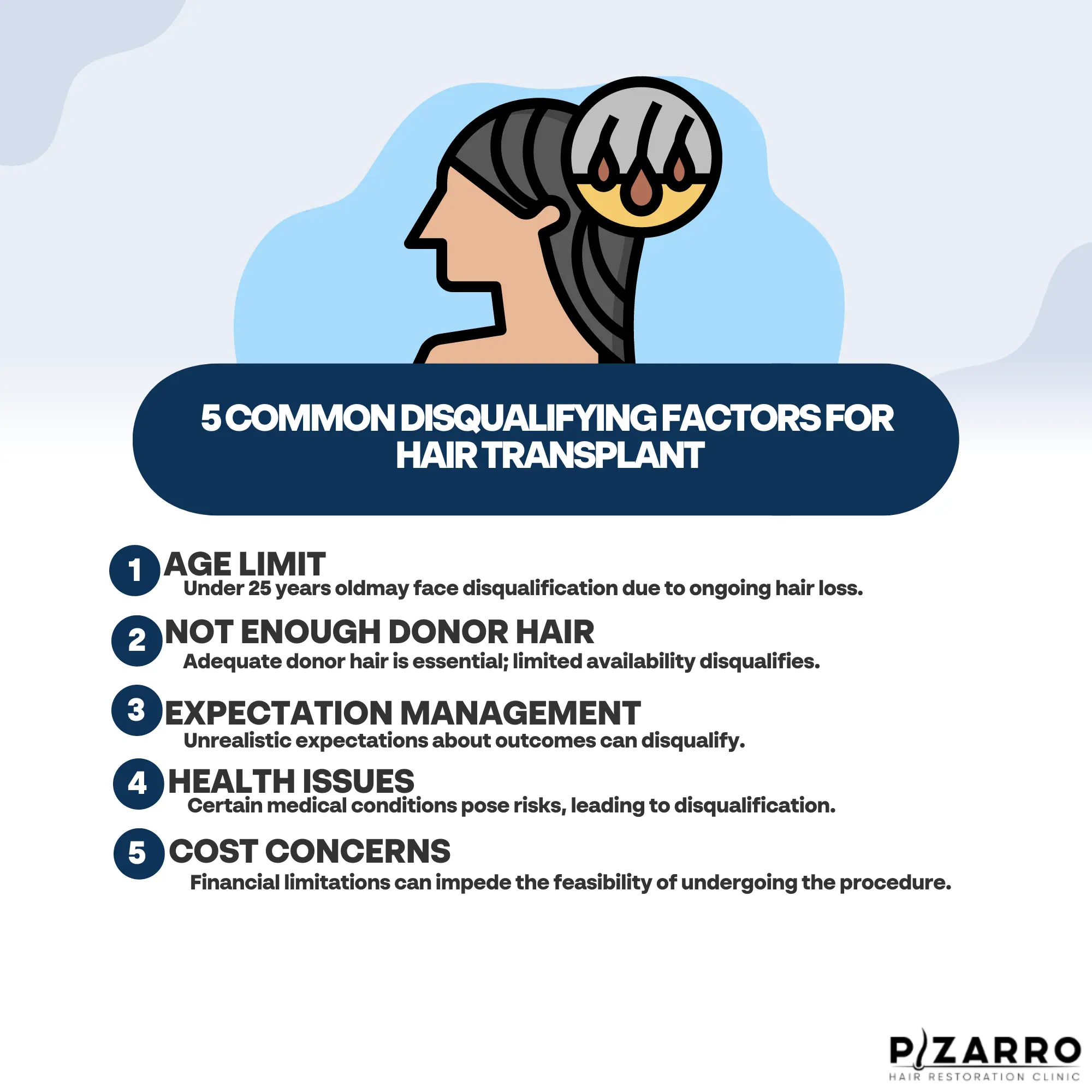Some people may suffer from hair loss because of hormonal changes, genetics, or medical conditions. A hair transplant can be a life-changing solution for those who have tried different remedies without success. However, only some are suitable candidates for hair transplant.
Before you get your hopes up, it’s crucial to determine if you meet the necessary requirements for a successful hair transplant. To help you, we’ll discuss the five common disqualifying factors for hair transplant.
1. Age
Age is a significant consideration when it comes to hair transplantation. While the procedure has no specific age limit, it is generally not recommended for individuals under 25. This is because younger individuals may still be experiencing hair loss and have unpredictable hair patterns.
Hair loss in younger individuals can be progressive, and undergoing a hair transplant too early may result in an unnatural appearance as the hair loss continues. To ensure the best and most long-lasting results, waiting until the pattern of hair loss has stabilized before considering a hair transplant is essential.
However, each case is unique, and some younger individuals may be suitable hair transplant candidates if they have significant and stable hair loss. In such cases, it’s best to consult a hair restoration professional for the next course of action.
2. Insufficient Donor Hair
Alopecia refers to hair loss. If you are wondering, “Can someone with Alopecia get a Hair Transplant?”, well, it can be a disqualifying factor for hair transplants. One needs sufficient donor hair, typically taken from the back or sides of the scalp, for the procedure to succeed.
Those who do not have enough healthy hair in the donor area may not be suitable candidates for a hair transplant. There won’t be enough hair to transplant and achieve the desired results.
However, advancements in hair restoration techniques have allowed some individuals with limited donor hair to undergo hair transplantation. These techniques include using body hair or combining hair transplants with other treatments. Despite these options, only some people with alopecia will be eligible for a hair transplant.
Suppose you have alopecia and are considering a hair transplant. In that case, it’s crucial to consult with a hair restoration specialist. Trust a professional who can give you a science-based evaluation of your condition and suggest the best treatment.
3. Unrealistic Expectations
While the procedure can significantly improve your appearance and self-confidence, it is essential to understand its limitations.
A hair transplant can provide natural-looking results, but it cannot guarantee a full head of hair or perfectly recreate your pre-hair loss density. The characteristics of the hair, such as its color and texture, extent of hair loss will play a big role in the success of the procedure.
Individuals who expect unrealistic outcomes, such as a complete reversal of their hair loss or a specific hairline design, may not be suitable candidates for a hair transplant. It’s essential to have a thorough discussion with a hair restoration specialist to set realistic goals and understand what can be achieved through the procedure.
4. Underlying Medical Conditions
While a hair transplant can be a viable option for many individuals, it may not be recommended for those with certain underlying medical conditions. Existing medical conditions can hinder the healing process or increase the risk of complications.
Before undergoing a hair transplant, you must disclose your complete medical history to the hair restoration specialist. This will allow them to evaluate whether you’re a suitable candidate for the procedure or if alternative treatments should be considered.
Specific medical conditions that may disqualify you from a hair transplant can include uncontrolled diabetes, autoimmune diseases, significant heart and lung conditions, and bleeding disorders. These negatively affect the success of the hair transplant by increasing the risk of medical complications.
However, it’s worth noting that not all medical conditions will automatically disqualify you from a hair transplant. In some cases, if the medical condition is well-managed, the hair transplant can still be performed. The decision will ultimately depend on the hair restoration specialist’s assessment of the potential risks and benefits.
5. Financial Constraints
While hair transplantation can be a life-changing procedure, it’s essential to consider the financial aspect. Not everyone with alopecia will be able to afford a hair transplant. Evaluating your financial situation and determining if allocating funds for a hair transplant is feasible is crucial. However, suppose you’re interested in getting a hair transplant but are currently facing financial constraints. In that case, you may explore alternative options such as hair loss medications or non-surgical hair restoration methods.

Conclusion
A hair transplant is a life-changing decision, but it’s not suitable for everyone. Several factors can disqualify you from the procedure, including your age, the extent of hair loss, and the presence of underlying medical conditions.
Individuals with alopecia should note that not all cases will be eligible for a hair transplant. The procedure’s success depends on having sufficient donor hair and realistic expectations.
If you’re considering a hair transplant, look for a professional hair restoration specialist who can give you an honest evaluation on the best option for you, whether a hair transplant or an alternative option.
However, a hair transplant is your preferred choice for addressing hair loss. In that case, it’s crucial to consider the financial aspect and ensure you can allocate the necessary funds for the procedure.
Looking for a Hair Transplant in Florida?
Suppose you’re looking for a hair transplant Florida expert and are searching for a reputable hair restoration. In that case, Pizarro Hair Restoration is here for you. We offer state-of-the-art hair transplant procedures tailored to your unique needs. Contact us today and take the first step toward restoring your hair and confidence.






